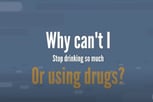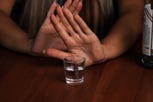An overactive ego is too often the reason why many people remain active in their addiction and refuse to get help. When the ego is overgrown and in a state of dysfunction—as it is during active addiction—it’s not big on humility, accountability, personal growth, or pain. As such, people who are seemingly controlled by ego continue to refuse to take responsibility for their actions, their underlying emotional or mental issues, or the disease of addiction itself.
Additionally, the ego’s defense mechanisms vehemently kick in with any confrontation that speaks against it. This is one reason organized interventions require multiple individuals of varying authority and significance to team up, battle the ego and wear down all its defenses.
What is Ego?
According to Merriam-Webster, an ego is “a part of the mind that senses and adapts to the real world.” More elaborately, it is defined as “one of the three divisions of the psyche in psychoanalytic theory that serves as the organized conscious mediator between the person and reality especially by functioning both in the perception of and adaptation to reality.”
Regarding active addiction, the ego is deluded and spinning out of control. Self-opinion is heavily distorted in one way or another. And, quite clearly, the so-called conscious mediator becomes more of a paranoid war-wager between the person and the outside world. Perception becomes irrational, as do any efforts to achieve adaptation.
Of course, there is a need for ego in some respect. In fact, individuals with high self-esteem, a sense of self-awareness, and accountability typically possess a healthy amount of it. But, a person's ego becomes excessive and dysfunctional when problems with addiction are at play.
In an article titled “The Elements of Ego Functioning,” Dr. Gregg Henriques writes that a poor-functioning ego lacks insight, agency, self-directedness, self-esteem, acceptance, and compassion, empathy for others, integration, purpose, thematic coherence, philosophical and moral development. Certainly, an individual in active addiction lacks much, if not all, of the same. Therein lies the obstacle.
How to Win the Battle Against an Overactive Ego
When the ego goes unchecked in active addiction and the individual struggles with or develops a lack of all of the above, there is nothing outside influence can do to force the person to seek help. Generally speaking, no amount of mirroring, pleading, or confrontation will persuade them. The dysfunctional ego will always stand strong in its irrational defense.
This reality is one explanation for the wording in the 12 Steps. Beginning with Step One—admitting there is a problem—and progressing chronologically to other steps, such as making amends and taking a personal inventory, one clear purpose of the 12 Steps is to deconstruct a dysfunctional ego; to keep it in check with reality and honest with the self.
Regardless of whether a person goes through the 12-Step program to treat their addiction, it’s undebatable that the first step to take is to admit you need to take one. And, if you or your life is out of control, regardless of what your ego is telling you, you do have a problem. And, for the record, it is bigger than you.
For an unchecked ego, that last pill is a jagged one and a bit tough to swallow. But that’s where humility comes in, and active addiction starts to quiver.
Silencing your ego during a moment of contemplation—possibly this moment—allows you to realize you are indeed struggling with an addiction, and it is out of your control. Seeking treatment for your addiction is the first step to take in a recovery continuum, which by definition is unending and spurs you to acquire more insight, empathy, compassion, purpose, integration, and all else missing in poor ego functioning and active addiction.
If you or someone you know is seeking help with addiction, please visit our directory of treatment centers or call 866-606-0182 to start the path to recovery today.








